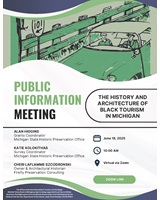Thousands of Resources, Ready to help.
Advantages
Popular

African American Recreational Tourism and Negro Motorist Green Book Sites in Michigan
Travel for African American families during the early and mid twentieth century was challenging even in northern states like Michigan. In 1936, Victor H. Green, a New Jersey postal worker and civic leader, published his first Negro Motorist Green Book to assist travelers in finding safe places to visit and get fuel, food, and other services. While initially limited to New York City, the books soon expanded to other states including Michigan. During the thirty years the Green Book was published, approximately 230 Michigan businesses were listed.
The African American Recreational Tourism and Negro Motorist Green Book Sites in Michigan project launched in June 2025 and will run through 2027. Interested members of the public can contribute what they know about Green Book sites and will have several opportunities to participate and receive updates on this statewide effort. Click the link to learn about the project, timeline, key project individuals, and how you can be involved!

African American Recreational Tourism Public Input and Participation Opportunities
Learn More!The goal of the Green Book Sites Project is to identify and document those Michigan properties listed in the Green Book which still survive today. In the years following the Great Depression, Michigan saw an influx of Black southern families arriving in cities like Detroit, Muskegon, Grand Rapids, and Benton Harbor, but also more rural locations such as Cass County. At the same time, travel by automobile was becoming more popular which created a need for safe places for African American travelers to spend the night, fill up the tank, eat, and shop. Michigan's first listings appear in the 1938 edition of the Green Book with locations in Detroit for a number of hotels, a single night club and a single service station. The Michigan listings quickly expanded to other communities across the state including Idlewild, suggesting the book's utility for planning recreational travel.
In 2024, the Michigan State Historic Preservation Office was awarded a National Park Service African American Civil Rights program grant to identify and survey extant properties listed in the Negro Motorist Green Book.
The project and research will create several documents:
For more information on the Green Book Sites in Michigan Project, contact:
Katie Kolokithas, Survey Program Coordinator
State Historic Preservation Office
[email protected] or 517-285-9248